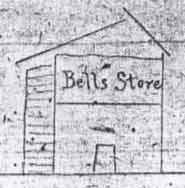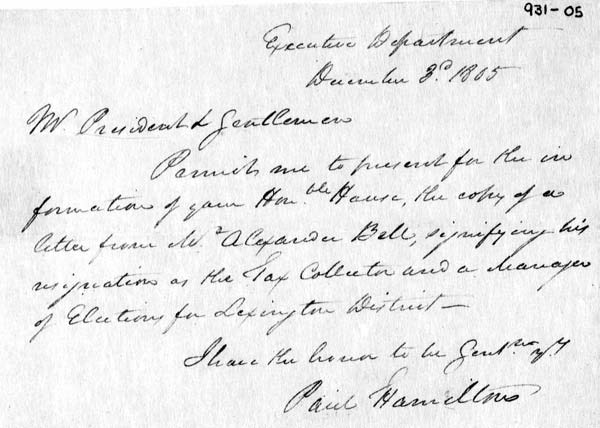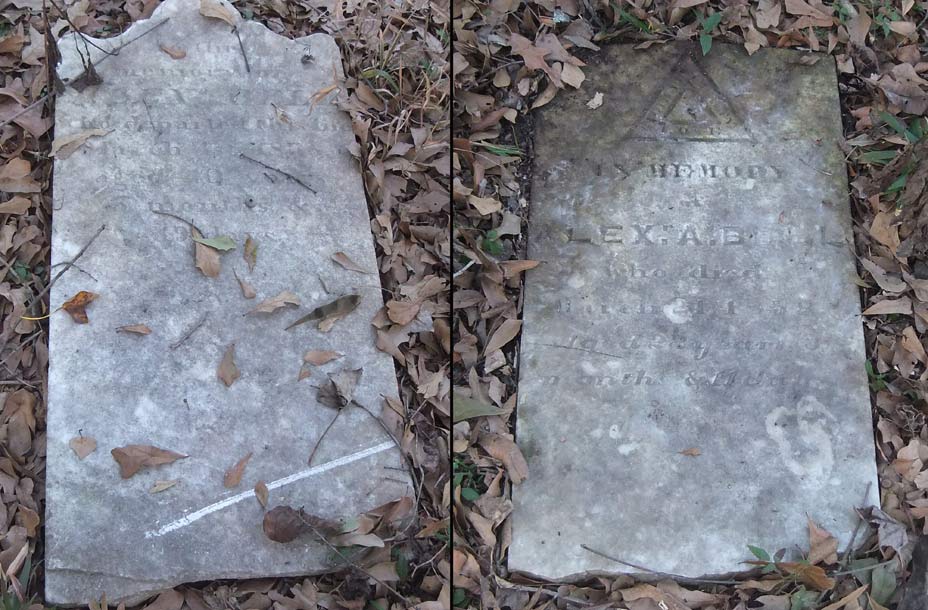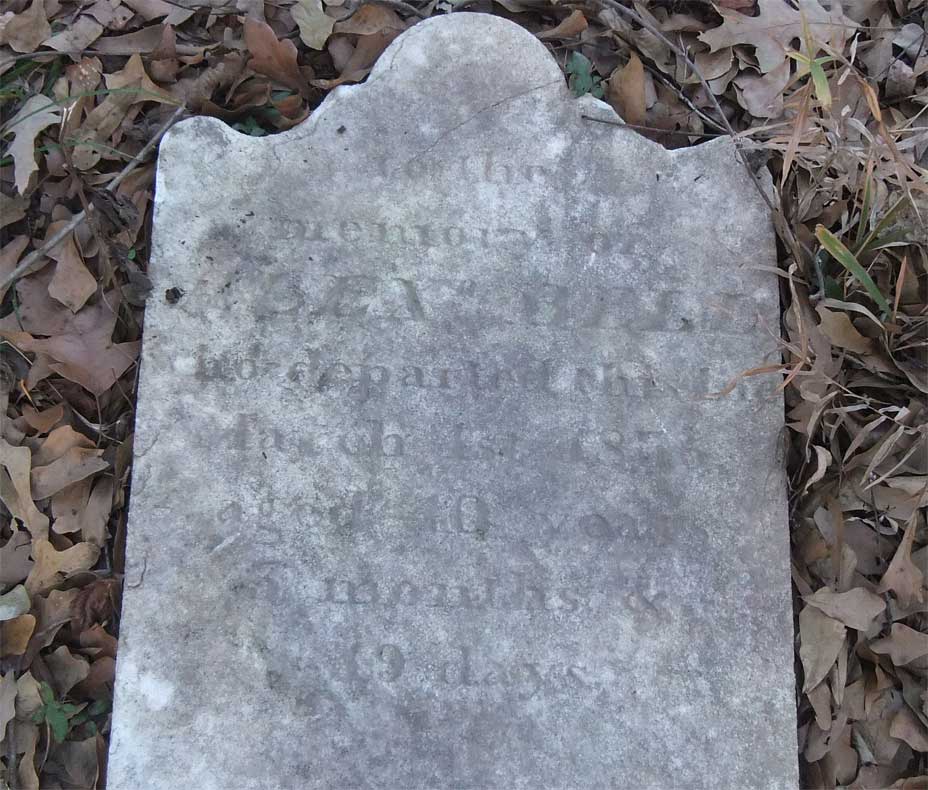Sarah Friday's 1810 Granby Drawing
Bell's Store

Bell's Store: Alexander Bell was a Lexington County Tax collector and an Election Commissioner according to documents at the South Carolina Archives.
Below: Alexander Bell's 1805 resignation notice:

Alexander Bell was a Lexington County Tax Collector and an Election Commissioner, according to documents at the South Carolina Archives. The Bells’ home also served as a store in the town square of Granby. Three generations of Alexander Bell in Granby have headstones in the old Granby Cemetery, but a Riverland Park resident says she remembers a Bell family cemetery just inside the quarry, near where Bell's Store was located according to Sarah's drawing. The last Alexander Bell died at the age of 22, and his gravestone includes a Freemason triangle of Hope, Faith, and Charity. Between the years 1733 and 1737, the Freemason Grand Lodge in England sanctioned Provincial Grand Lodges in Massachusetts, New York, Pennsylvania, and South Carolina. It is possible this once-secret society had a strong presence among the wealthy men of Granby.
The following expert is from "Random recollections of a long life 1806 to 1876", by Scott, Edwin J.
Mr. Scott gives a view of Granby that is very similar to Sarah's drawing but about 10 years later. Scott also tells a story centered around the Bell's daughter Harriet Bell who would have been 20 years old at the time.
"OLD GRANBY"
At Granby the British had a fort in the war of the Revolution, and Mr. Cayce's house, that stands on the hill just North of the place, shows a hole in its Northern end made by a small cannon ball when the fort was besieged, and I believe captured by the Americans, towards the close of the war.
The town being at the head of navigation on the Congaree, with a ferry on the road leading to the up country, and broad, fertile river swamp lands extending many miles below, was a place of considerable business, and some of its merchants made fortunes and lived in good style.
Their families were well educated and formed a circle of refined society, that was at once moral and elevated. Among them were the Bills, Hines, Arthurs, Fridays, Seibelses and others, whose representatives go to make up the present population of Columbia and its vicinity. But when the State capital, the South Carolina College and the sessions of the Supreme Court were established at Columbia, Granby began to decline. It had always been unhealthy, the superior capital and enterprise of the merchants in Columbia in time drew trade from the place, and after the removal of the County seat to Lexington it became a deserted village; so that in 1822 but two or three stores remained, those of Muller & Senn and Pou & Seibels (Lewis Pou and Henry Seibels) being all that I recollect.
When I first collected taxes there in 1825, General Henry Arthur, Wolf Hane, son of Nicholas Hane, a rosy old gentleman, owner of the ferry, Mrs. Elizabeth Bell, Friday Arthur and James Cayce, who kept a public house, a mill and blacksmith and coach-making shops, were the most prominent reliques of Granby's former prosperity. And here I will repeat an anecdote related by John Caldwell, which may be called
A TALE OF A SHIRT.
On a fine sunny morning in May, 1806, a gay party of young folks, both male and female, assembled at the residence of Alexander Bell, Sr., in Granby, to take an excursion on horseback some ten miles up the river to the ferry on Saluda, then known as Kennerly's, just above which James Kennedy, Esq., resided; his dwelling, a roomy, rambling country house, being on the East bank of the river, so close to it that a heavy body dropped from one of the windows would fall into the water.
Among the gentlemen present were John Caldwell of Newberry, and John Mayrant of Sumter, both then in College, and it was arranged that they, with two of the girls, should pass the night and part of the next day at Kennerly's, while the rest of the cavalcade, after all had enjoyed themselves boating and fishing in the river, were to return to Granby at the close of the day. The two collegians were rivals for the favor of one of the young ladies who remained behind when the others had gone back. They were dressed in the tip of the prevailing fashion, but Mayrant rejoiced in the display of a magnificent ruffled shirt, got up in better style and of finer material than usual, so that it attracted the attention and excited the applause and admiration of the fair sex, and, as Caldwell thought, gave its owner an advantage that he was not otherwise entitled to.
At bed time they were put into the same room with several other young men who had called to see the belles from Granby, and Mayrant, to save his shirt from being rumpled, pulled if off and hung it upon a chair. This was observed by Caldwell, who, instigated by the demon of mischief and jealousy, and counting all means fair in love and war, resolved to put the offending garment out of the way. Accordingly, at the dead of night, while all the others were asleep, he rose stealthily, and, wrapping the object of his hate around a brick, threw it from one of the windows as far as he could into the river.
Next morning when Mayrant arose his shirt was miss-ing, and, after a thorough and fruitless search, he was forced to button up his vest and coat, and, leaving an apology to the ladies and family for his sudden departure, to order his horse and take the road to Columbia, leaving Caldwell in full possession of the field. Whether he suspected his rival of any agency in the mysterious disappearance of the garment was not known; but Caldwell said twenty years afterwards that he could never muster up the courage to tell Mayrant what had become of his shirt.
Neither of them succeeded in gaining the young lady, a Miss Bell, who was first married to a Mr. Heron and afterwards to Major Benjamin Hart.
As already stated, the old court house, after being used as a Presbyterian church, in Columbia, became the residence of Mr. Kinard.
James G. Gibbes, whilst manager of the Saluda Factory, bought the rest of the old houses in Granby from Captain Alexander R. Taylor, for three hundred dollars, and moved them to the Factory, where he converted them into dwellings and outhouses for the operatives, but he found great difficulty in drawing out the wrought nails with which they had been built. These had been made before the introduction of cut nails, and were hammered out separately on the anvil by the blacksmith, and, owing to their roughness, they adhered to the wood so as to split the boards and leave Gibbes less profit than he had expected from the purchase."
As mentioned by Mr. Scott, Harriet Bell would eventually marry Benjamin Hart. "Hart was a strict Methodist and' temperance man. He lived in Lexington at one time, was Senator from that District and owned Kennerly's or Hart's Ferry on Saluda, his wife being a widow Herron, a member of the Bell family of Granby. His daughter, Claudia, married "Dot" Means, of Fairfield, and Miss Mary became the wife of Colonel Robert Preston, of Virginia." In 1845, we find her obituary which confirms this:
Mrs. Harriet Hart ,Wife of Major Benjamin Hart
8-17-1786 - 9-6-1845
Died, by a sudden attack of apoplexy, on the evening of the 6th ult., Mrs. Harriet Hart, wife of Major Benjamin Hart of Columbia, in the 60th year of her age. Having brought up a most interesting family, her life was renewed in the bright prospects of her children.
Below: The graves of two Alexander Bell's in the Granby Cemetery.


Bell's store site: Status: Under a slag pile. Archaeology is not feasible this location on the quarry property (Click here to see this location on a map)